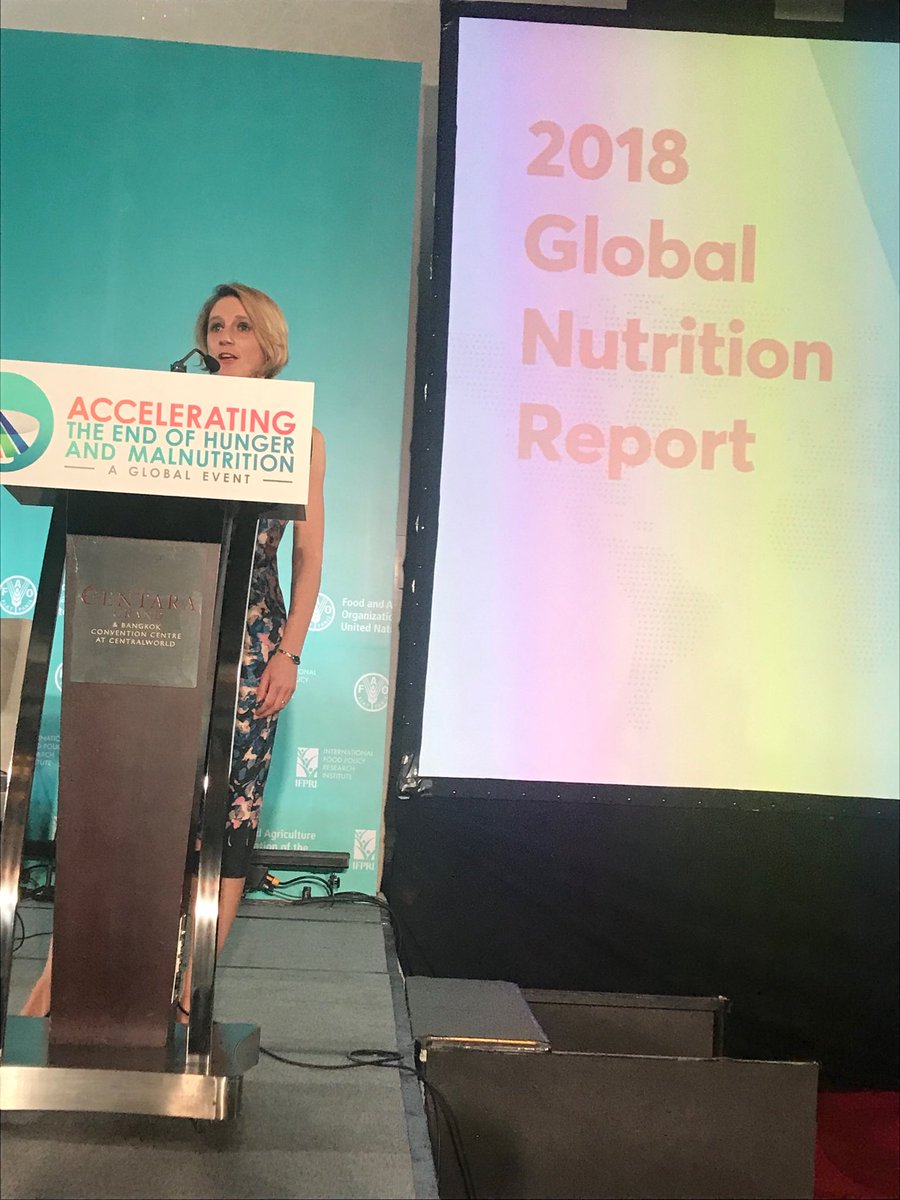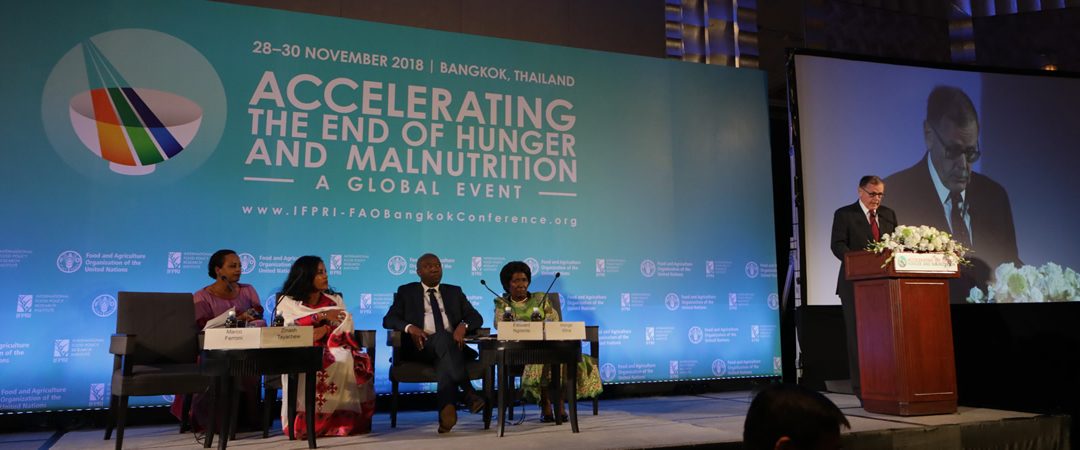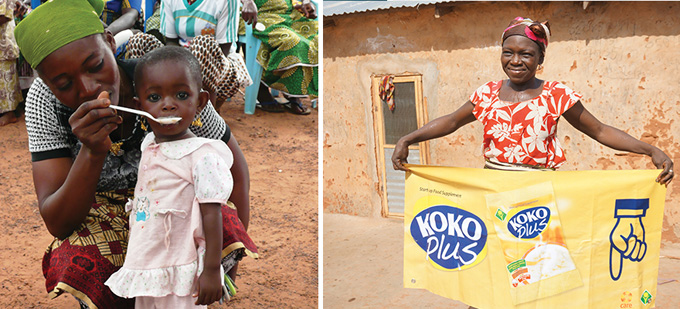Li, X. and Siddique, K.H.M. 2018.
Future Smart Food - Rediscovering hidden treasures of neglected and underutilized species for Zero Hunger in Asia, Bangkok,
242 pp.
To tap the high potential of NUS, FAO RAP has organized a Regional Expert Consultation on Scoping and Prioritizing NUS through an interdisciplinary priority-setting exercise in
December 2016, in collaboration with the FAO Special Ambassador for the International Year of Pulses, ICARDA, ICRISAT, MSSRF-LANSA, ACIAR, Mahidol University, the University of Western Australia, ICIMOD, CATAS-TCGRI, CFF, national governments and research institutes of
Bangladesh, Bhutan, Cambodia, Lao PDR, Myanmar, Nepal, Vietman and India, as well as civil society (Akshaya Patra Foundation). It adopts an innovative methodology to identify NUS as FSF that meet four criteria on nutrition, agriculture, ecology and socio-ecological dimensions, which led to the priority list of Future Smart Food at the country level.
The report presents the major outcome of this regional priority-setting exercise on NUS and has as its purposes:
- to demonstrate the multidimensional benefits of Neglected and Underutilized species (NUS) and their potential contribution to achieving Zero Hunger;
- to identify promising NUS that are nutrition-dense, climate-resilient, economically-viable and locally available or adaptable as FSF;
- to highlight the challenges and opportunities for harnessing these less-mainstream food crops encounters; and
- to provide strategic recommendations to create an enabling environment for the promotion, production, marketing and consumption of Future Smart Food, assuring healthy diets for the future.
Future Smart Food, referring to NUS that are
nutrition dense, climate resilient, economically viable and locally accessible, represent a promising abundance of food resources and constitute the bedrock of the food system.
 |
| Challenges to NUS by category |
Extracts of the publication:
For centuries, people in Asia and the Pacific have grown and consumed a wide variety of nutritious foods. Unfortunately, more recent generations have slowly but surely changed their diets and have moved away from many of these traditional foods.Increasing the availability of and access to nutritious foods necessary for a healthy diet will help to close both the
production and nutrition gaps.
But conventional staple foods do not supply all the nutrients needed for a balanced
diet. Agricultural production in Asia focuses on a few staple crops, particularly rice. The pattern reflects a structural issue: too many people consume food with too few nutrients and too much food is being produced without offering enough nutrients. This is often the involuntary consequence of government policies that prioritize quantitative food production targets.
Tackling the health problems caused by malnutrition requires a transformation of current agriculture and food
systems towards more diversity on all levels.
 |
| Regional priority-setting exercise on scoping, prioritizing and mapping of NUS |
Part II (Chapter 6 through Chapter 13) provides an overview of scoping and prioritizing FSF for eight countries:
Bangladesh, Bhutan, Cambodia, Lao PDR, Myanmar, Nepal, Viet Nam and West Bengal in India. For each country,
high-potential crops were shortlisted after being prioritized on the basis of a set of multi-dimensional criteria.
The
studies include:
- mapping of the availability of FSF,
- an assessment of their multiple benefits and the challenges they
face,
- and feature lists of prioritized crops with potential in each country.
Each study provides background on
- the
country’s agro-ecological environment, food composition, predominant cropping patterns and crops in the national
farming system.
- A situation analysis identifies gaps and major challenges each country is facing with regard to
hunger and malnutrition, climate change, and market and economic considerations, as well as cultural aspects.
To
link suitable FSF in each country to the identified challenges, potential FSF were assessed and prioritized according to
their nutritional features, adaptation potential to local environments and climate change, economic potential,
and sociocultural suitability. Each study also includes a set of recommendations and subsequent actions to further
promote FSF in the respective country.
A lucky few NUS have made their way to export niche markets around the world. Apart from their advantages for nutrition and production, the selected NUS also needed to be economically viable and socially acceptable.
The criteria for prioritizing NUS were established in four categories. Each participating country conducted assessments according to these criteria:
- Nutrition (nutritional value and health benefits); Currently there is only limited information on the nutrient composition of NUS and FSF, which needs to be analysed and linked to respective health benefits.
- Production (local knowledge, availability, seasonality, productivity, intercropping and competition from other crops, and processing);For some NUS the amount that can be
consumed in proportion to the weight is low.
In addition, it can be is difficult to process and
propagate soem NUS and trees may bear fruit for several
years. Some NUS also tend to attract borers,
pink disease, leaf spot, collar rot and rust.
- Ecology (agro-ecology, adaptability to potentially changing local climates and soil types),
More research is needed to identify climate-resilient varieties and varieties more tolerant to abiotic and biotic stresses. Priority should be given to genetic and husbandry improvement of NUS and FSF.
- Socio-economy (cultural acceptance and consumer preferences, access to markets and potential income generation).
See below (socio-economic challenges)
The regional priority-setting exercise focused on the following groups:
- cereals,
- horticultural species,
- nuts and pulses,
- roots and tubers, and
- others.
Promotional efforts would require germplasm collection
of endangered species, documentation of collected
materials, development of diversified cropping systems
that include NUS, improved public awareness of the
importance of NUS for nutritional value and health benefits, and research on sustainable management
practices for underutilized species and
improved marketing.
NUS have
remained ignored often for reasons of poor commercial
performance, restricted distribution, consumption by
small population groups, inadequate research, absence
of modern processing and post-harvest methods,
and lack of organized value chains and policy support
for popularization. Bioversity
International has initiated a special programme,
“Moving from orphan to high potential crops,” aimed at
mainstreaming certain NUS and making them more
popular to substitute or supplement major food crops in
Africa, Asia and Latin America.
Socio-economic challenges:
- Most of the local foods cannot be stored long-term and
preservation technologies have not been locally
developed. This has resulted in a shift to foods like
cereals and pulses which may not be as nutritious but
can be stored easily.
- Local food is losing favour even in
rural areas despite being readily available. Many of the
younger generation are unaware of many of these
food items.
- No specific legislature concerning NUS
- Risks of genetic degradation if these crops are lost due to the expansion of more commercial forms of agriculture
Processing challenges:
- Processing may require a substantial amount of fuelwood which contributes to deforestation.
- Some NUF contain toxins which must be removed by cooking for long periods. The stem requires prolonged boiling, with the water replaced once to remove irritating chemicals.
- For specific NUS oil extraction rates can be low when using a traditional oil expeller
- The taste may seem unfamiliar and so off-putting to potential consumers.
- Processing techniques should be advanced, and recipes need to be diversified.
- It may be difficult to process NUS which have low yields and small grains. SomeNUS are susceptible to waterlogging and frost, damping off, powdery mildew and rust.
- Some NUS may need to be processed as soups because eaten raw because it may cause an itchy, stinging, and very irritating sensation to the throat.
- Sanitary and Phyto-sanitary (SPS) standards
Market challenges:
- Uncertain pricing
- The lack of short-term storage facilities
- High market fees
- Lack of access to credit
- Extended sales chains between farmers, intermediaries, retailers and consumers,
- Lack of market information
- Lack of modern transportation facilities
- Lack of affordable, available and adapted packaging materials
- High transportation costs
- Large disparities between farm gate prices and urban retail prices
- Un-existing private sector self-regulatory SPS standards setting mechanisms





































